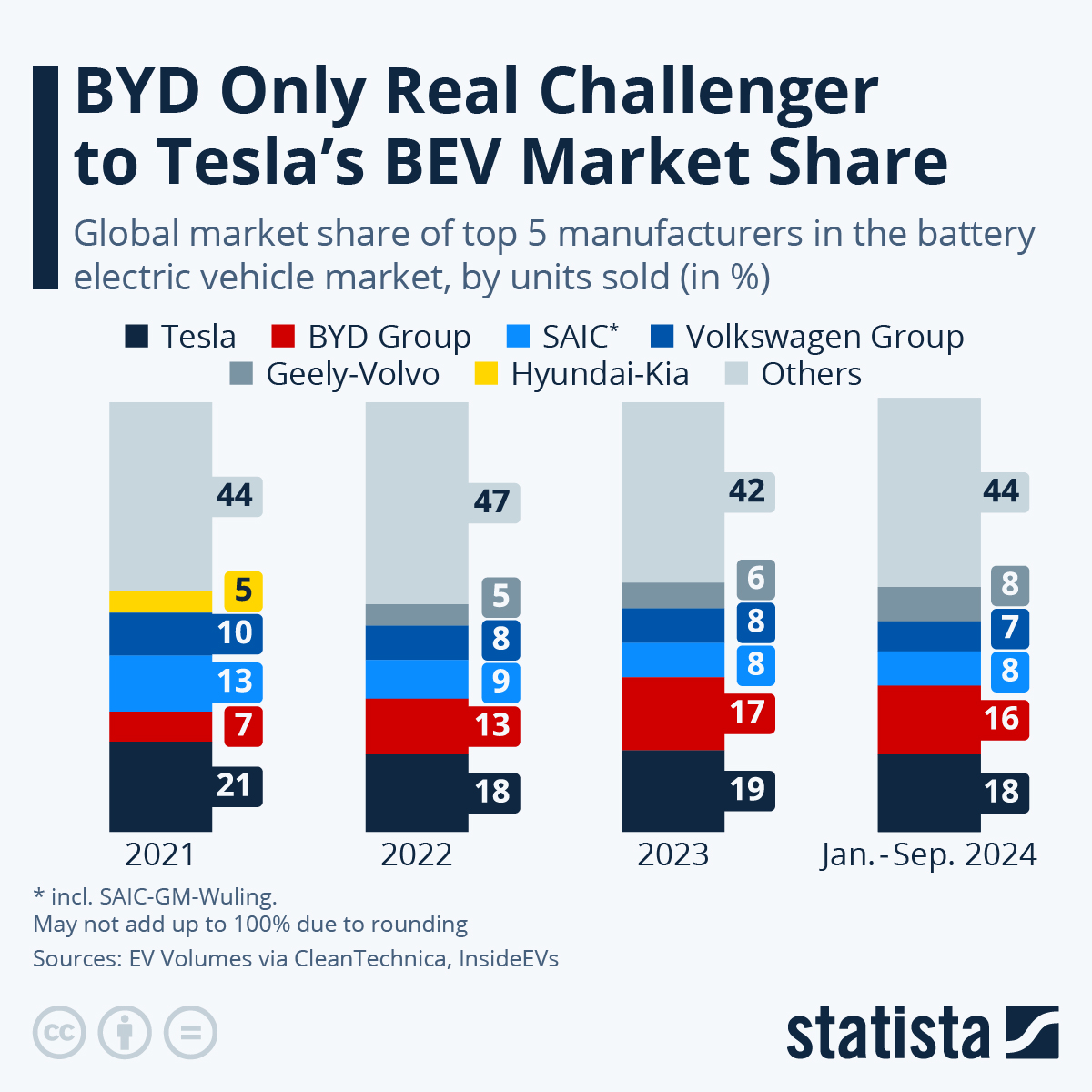
As of September 2024, Tesla retained the biggest market share among all battery electric vehicles (BEVs) sold worldwide in 2024, but only slightly. In 2023, Tesla's share stood at 19 percent before dropping to 18 percent in first nine months of 2024, according to analyses by EV Volumes published on CleanTechnica.
The competition is now hot on Tesla's heels. As Statista's Florian Zandt shows in the chart below, the Chinese conglomerate BYD, which produces standalone electric vehicle batteries and associated electronics in addition to plug-in hybrid and fully electric vehicles, increased its market share by 9 percentage points between 2021 and 2024.
You will find more infographics at Statista
As CleanTechnica points out, BYD's market share in the BEV market might not increase that much in 2025 due to the manufacturer focusing on plug-in hybrid electric vehicles in the upcoming year.
The BEV portfolio of legacy automakers like Volkswagen and Geely-Volvo stood at 7 and 8 percent, respectively, while SAIC, which includes the joint venture between the Chinese state-owned SAIC Motor and Wuling as well as General Motors, also had a market share of 8 percent as of the most recently available data.
Between 2023 and January to September 2024, BYD's and Tesla's shares dropped by 1 percentage point each. BYD is focused on providing BEVs to a more general consumer base, while Tesla's products have a higher price tag. This difference might be slightly mitigated through the increase of tariffs on Chinese-made cars from 25 to 100 percent which came into effect in August 2024.
According to EV Volumes, 14 million electric vehicles were sold globally in 2023, 70 percent of which were BEVs. However, 84 percent of all light vehicles sold still ran on traditional combustion engines or other non-electric fuel sources. The biggest exporter and market for both hybrids and BEVs was China with shares of 65 and 59 percent, respectively.
As of September 2024, Tesla retained the biggest market share among all battery electric vehicles (BEVs) sold worldwide in 2024, but only slightly. In 2023, Tesla’s share stood at 19 percent before dropping to 18 percent in first nine months of 2024, according to analyses by EV Volumes published on CleanTechnica.
The competition is now hot on Tesla’s heels. As Statista’s Florian Zandt shows in the chart below, the Chinese conglomerate BYD, which produces standalone electric vehicle batteries and associated electronics in addition to plug-in hybrid and fully electric vehicles, increased its market share by 9 percentage points between 2021 and 2024.
You will find more infographics at Statista
As CleanTechnica points out, BYD’s market share in the BEV market might not increase that much in 2025 due to the manufacturer focusing on plug-in hybrid electric vehicles in the upcoming year.
The BEV portfolio of legacy automakers like Volkswagen and Geely-Volvo stood at 7 and 8 percent, respectively, while SAIC, which includes the joint venture between the Chinese state-owned SAIC Motor and Wuling as well as General Motors, also had a market share of 8 percent as of the most recently available data.
Between 2023 and January to September 2024, BYD’s and Tesla’s shares dropped by 1 percentage point each. BYD is focused on providing BEVs to a more general consumer base, while Tesla’s products have a higher price tag. This difference might be slightly mitigated through the increase of tariffs on Chinese-made cars from 25 to 100 percent which came into effect in August 2024.
According to EV Volumes, 14 million electric vehicles were sold globally in 2023, 70 percent of which were BEVs. However, 84 percent of all light vehicles sold still ran on traditional combustion engines or other non-electric fuel sources. The biggest exporter and market for both hybrids and BEVs was China with shares of 65 and 59 percent, respectively.
Loading…





